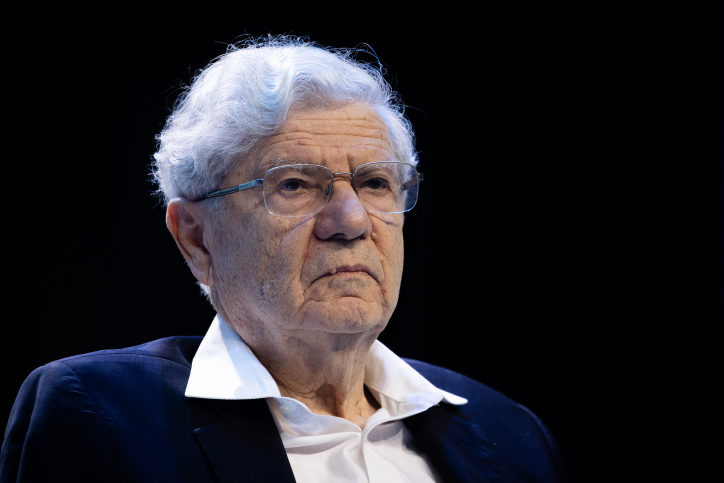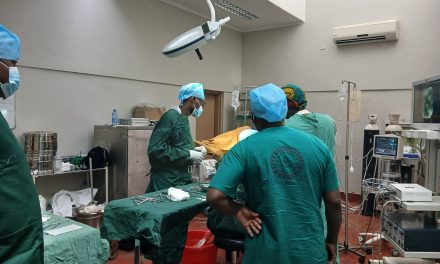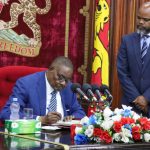
Aharon Barak and Israel’s legal illegality

In a historic move, the International Court of Justice (ICJ) held its first hearing in the proceedings initiated by South Africa against Israel on January 11 and 12. The application, submitted on December 29, contended that Israel’s conduct in the Gaza conflict amounted to genocide, thereby violating its obligations under the Convention on the Prevention and Punishment of the Crime of Genocide.
The Statute of the ICJ allowed state parties to appoint a judge ad hoc if the state lacked a judge of its nationality in the case. Both South Africa and Israel chose to appoint their own judge ad hoc, with South Africa selecting former Deputy Chief Justice Dikgang Moseneke and Israel opting for its former Supreme Court President, Aharon Barak.
The decision to appoint Barak came as no surprise. The 87-year-old, who served as a judge for 28 years, 11 as the president of the Supreme Court, had a distinguished career as the attorney general of Israel from 1975 to 1978 and an esteemed academic history at the Hebrew University.
Known for his international reputation, prolific writing, and a reputation as a Western liberal jurist promoting the rule of law and human rights in a challenging region, Barak’s legacy had an added layer – that of a Holocaust survivor and a fearless human rights champion.
Barak presided as a judge in a case where South Africa contested the legality of Israel’s actions in its brutal war against the Palestinians. The Supreme Court of Israel, under Barak’s tenure, had been the final arbiter of the legality of Israeli practices since the occupation of the West Bank and Gaza in 1967. His appointment as judge ad hoc provided an opportunity to scrutinize his and the court’s record, examining how they shaped Israel’s application of international law.
One of the thorniest issues Barak dealt with was the question of Israeli settlements in the West Bank and Gaza. Despite widespread consensus on the illegality of these settlements and a list of international law authorities, including UN resolutions and an ICJ opinion, the Supreme Court, under Barak’s leadership, ruled in 1993 that settlements were “non-justiciable.” This decision refused to discuss their legality under international law.
While the court aimed to temper some of the excesses of the settlement project to prevent chaos, the rules it set out served to legitimize the entire settlement endeavor. As a result, the settler population skyrocketed from a few thousand in 1975 to 700,000 in 2023.
A similar pattern emerged in cases related to the wall built by Israel in the West Bank. In 2004, the ICJ issued an advisory opinion declaring the wall illegal due to its violation of the human rights of the Palestinian people. However, Barak’s court provided the legal stamp of approval, legitimizing a project that significantly restricted Palestinian movement.
The Supreme Court, under Barak, continued to endorse the practice of punitive home demolition, a savage tactic used against the families of Palestinians suspected of resisting the occupation. Despite dissenting views, the court, under Barak’s leadership, approved the practice, presenting it as an administrative measure intended to promote security through deterrence. While in a few cases the court deemed demolitions disproportionate, it never challenged the practice’s manifest illegality under international law.
Another contentious issue was the use of torture, where Barak’s court left the door open for “physical investigation means” in situations of a “ticking timebomb.” Despite a marked decrease in reported cases initially, the backdoor introduced by Barak turned into a gateway, leading to a significant increase in torture cases against Palestinian political prisoners.
In the case of Mubarak Awad, a Palestinian activist, Barak’s court dismissed Awad’s legal challenge, providing a precedent used by the Israeli government to invalidate the Jerusalem resident status of thousands of Palestinians. This legal framework, treating the native Palestinian population as migrants, persists today, severely limiting Palestinians’ ability to travel, seek education, and work abroad.
These examples, among others, illustrate Barak’s approach to international law—ignoring it when it did not suit Israel’s goals or applying a distorted version that created an image of compliance with the rule of law and human rights while allowing wrongful practices to continue with some constraints.
For Palestinians, the consequences were dire, with increasing settlers and settlements, normalization of torture and ill-treatment of prisoners, homelessness for children and families due to demolished homes, and tens of thousands unable to return to Jerusalem, considered alien immigrants without resident status.
While some may argue that Barak’s balancing approach was the best in the circumstances, the suffering of those on the receiving end of his rulings cannot be ignored. No legal analysis or political justification can hide or excuse the fact that, under Barak’s watch, a sophisticated system of a apartheid emerged, as documented by human rights organizations and UN special rapporteurs.
For a long time, Barak’s approach and reputation shielded Israel from legal reckoning in international tribunals and courts. His appointment as judge ad hoc to the ICJ became another iteration of his role as Israel’s legal “bulletproof vest.” With 16 other judges at The Hague, Barak faced the challenge of justifying his past stance, as he had seemingly made up his mind that the attacks of October 7 could be described as a genocide, but not Israeli attacks and practices, which Barak asserted were in line with international law.
The views expressed in this article are the author’s own and do not necessarily reflect Insight Bulletin editorial stanc
































